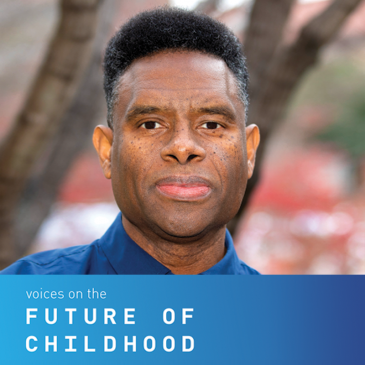What is one thing you believe must be done now to improve how children and families are faring during the current crisis, specifically as it relates to the media and technology in their lives?
Make ethical design mandatory.
 S. Craig Watkins is the Ernest S. Sharpe Centennial Professor at the University of Texas at Austin and the author of The Digital Edge and Don’t Knock the Hustle.
S. Craig Watkins is the Ernest S. Sharpe Centennial Professor at the University of Texas at Austin and the author of The Digital Edge and Don’t Knock the Hustle.
Since the COVID-19 global pandemic has taken hold, our use of screens and especially smartphones has increased dramatically, sparking ongoing debate about children’s relationship to screens. The real debate, of course, is not about their relationship to screens but, rather, their relationship to a rapidly evolving information environment that is marked by disinformation, bullying, and toxicity. These aspects of media and technology often induce anxiety, isolation, and lower levels of subjective well-being that undermine the capacity of children and teens to thrive. Guided by the “fail fast” mantra, many tech and media companies have not always made addressing toxic tech a top priority. But times are changing.
In the face of immediate public scrutiny, Big Tech companies like Facebook, Instagram, Twitter, and YouTube were forced to adopt exceptional measures and design algorithms to identify and remove disinformation while also working to circulate credible public health information about COVID-19. Most young people get their news and information from social media, which has become, for better or worse, their town square. The tech companies know this and understood that the life and death stakes of a global pandemic were too high to allow misinformation to proliferate, even if it meant more traffic and, in turn, more revenue and more influence.
But the stakes have always been high, and we have long needed tech companies to build products that pursue literacy and efficacy rather than power and money. The COVID-19 pandemic offers a compelling lesson: our technology must always be designed in ways that are ethical and intended to support the public rather than private interest. The cultivation of an information environment that promotes literacy, self-discovery, engagement, and critical reflection continues to be an important part of the development of children’s health and well-being. This approach to design is not optional; it must be viewed as central.
See more posts in this series:
Voices on the Future of Childhood
S. Craig Watkins | Debra Sanchez | Jenny Radesky | Karen Cator | Maria Alvarez
Michael H. Levine | Ralph Smith | Rosemarie Truglio | Vikki Katz
![]()

